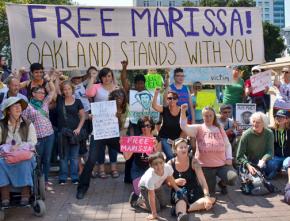Punished for defending herself
reports on the latest developments in the case of Marissa Alexander, and what they say about the racism and sexism at the heart of the injustice system.
IN ALMOST any other instance, Marissa Alexander would have been applauded. Fearing for her life, she scared off her attacker--someone she knew from past experience could cause her physical harm--by firing a warning shot into the wall. No one was hurt.
But instead of being recognized as a hero for standing up to her abusive husband, the Black mother of three was vilified and punished. In the latest chapter of her years-long ordeal, Alexander accepted a plea deal on November to avoid what could have been a 60-year prison sentence. According to the agreement, she pleaded guilty to aggravated assault, which carries a sentence of three years in prison. The time she has already spent behind bars--1,030 days--will be applied to her sentence, meaning she could be released at the end of January.
However, her ordeal may not end then. A second count against Marissa is considered an "open plea"--which means that the judge could decide to add another five years to her sentence during her hearing on January 27. After she is released, she will have to spend another two years under house arrest and wear a monitoring device.

Alexander's lawyer tried twice to use Florida's "Stand Your Ground" law--which is supposed to permit the use of deadly force, including firing a gun, if the shooter "reasonably believes it is necessary to do so to prevent death or great bodily harm to himself or herself or another or to prevent the commission of a forcible felony"--in her defense.
Alexander had good reason to be worried about her life. Her husband, Rico Gray, had been arrested twice before for attacking her, and he had a restraining order against him during the time of the incident in 2010 when she fired a warning shot into the wall during a domestic dispute.
Gray later admitted in his own deposition that it made sense for Alexander to believe he might hurt her. "If my kids wouldn't have been there, I probably would have put my hand on her," Gray stated. "Probably hit her...I honestly think she just didn't want me to put my hands on her anymore, so she did what she feel like she have to do to make sure she wouldn't get hurt, you know."
Despite all this evidence, however, Alexander wasn't allowed to use the Stand Your Ground defense. Florida State Attorney Angela Corey's central argument against Alexander was that she shot in "anger": "She was not in fear," Corey claimed.
"When a woman or minority is claiming they are defending themselves, they don't get the benefit of the doubt," Rita Smith, executive director of the National Coalition Against Domestic Violence, told the Daily Beast last year. "Most battered women who kill in self-defense end up in prison. There is a well-documented bias against women [in these cases]."
And Alexander didn't even hurt anyone.
IT'S NOT exactly clear on what basis Corey--who prosecuted the Trayvon Martin case, but failed to get a conviction against George Zimmerman for killing an unarmed Black teenager--decided that Alexander wasn't "afraid" enough to want to scare off her abuser, and thus eligible to use the Stand Your Ground defense. But her case against Marissa worked--she was sentenced to 20 years for aggravated assault.
On the other hand, Stand Your Ground laws have worked beautifully for other Florida residents--like Ralph Wald, a 70-year-old white man who used Stand Your Ground to win an acquittal after he shot and kill his wife's lover, a neighbor that he claims he didn't recognize.
Clearly, there are some laws that apply to white people and others that apply to Blacks. Alexander couldn't use Stand Your Ground in her defense--but on the other hand, Florida's mandatory minimum sentencing laws were designed for people like Marissa Alexander.
As the U.S. Sentencing Commission pointed out after conducting an investigation of mandatory minimums: "The disparate application of mandatory minimum sentences in cases in which available data strongly suggest that a mandatory minimum is applicable appears to be related to the race of the defendant, where whites are more likely than non-whites to be sentenced below the applicable mandatory minimum." The commission found that 54 percent of white defendants were sentenced at the mandatory minimum sentence, compared to 67.7 percent of Black defendants and 57.1 percent of Hispanic defendants.
Under Florida's "10-20-Life" laws, Alexander's "crime" of firing a warning shot mandated a 20-year prison sentence--despite the fact that she didn't injure or harm anyone. If she had gone to trial instead of making a plea deal, she faced a possible 60 years in prison for three counts of aggravated assault.
So it was the threat of 60 years in prison, due to mandatory minimums, that forced Alexander into admitting "guilt." As Greg Newburn of Families Against Mandatory Minimums explained, "While there was disagreement about Alexander's guilt or innocence, no one outside the State Attorney's office believed that 60 years in prison--or even the original 20 years--was an appropriate sentence for a first-time offender and a crime where no one was injured."
In other words, the long and punitive sentence was leverage to extract Alexander's guilty plea.
In what kind of upside-down system is a survivor of domestic abuse considered insufficiently "afraid" to try to scare off her attacker?
It's the same system under which a police officer gets by with gunning down an unarmed Black teenager because he claimed he "feared for his life."
It's a system that's racist to its core.


